
bigcodebench
[ICLR'25] BigCodeBench: Benchmarking Code Generation Towards AGI
Stars: 318
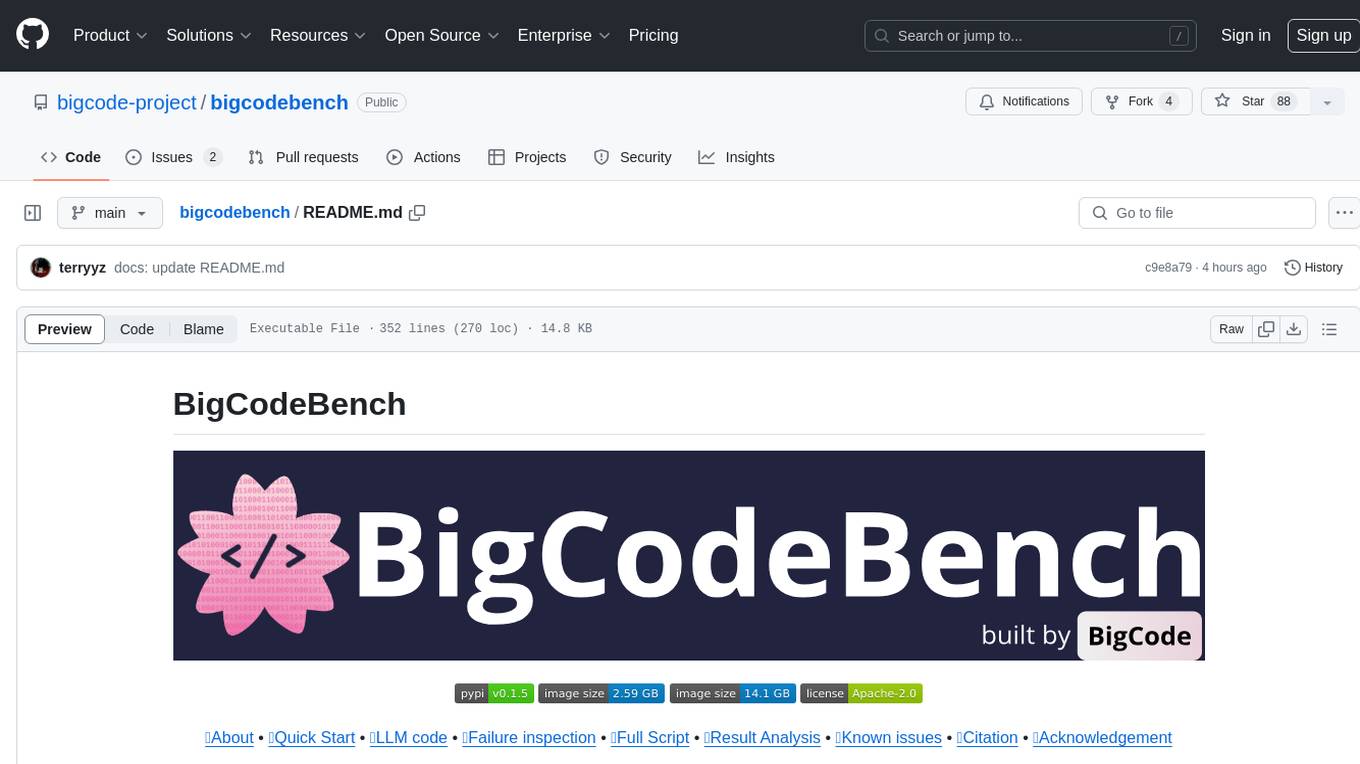
BigCodeBench is an easy-to-use benchmark for code generation with practical and challenging programming tasks. It aims to evaluate the true programming capabilities of large language models (LLMs) in a more realistic setting. The benchmark is designed for HumanEval-like function-level code generation tasks, but with much more complex instructions and diverse function calls. BigCodeBench focuses on the evaluation of LLM4Code with diverse function calls and complex instructions, providing precise evaluation & ranking and pre-generated samples to accelerate code intelligence research. It inherits the design of the EvalPlus framework but differs in terms of execution environment and test evaluation.
README:
💥 Impact • 📰 News • 🔥 Quick Start • 🚀 Remote Evaluation • 💻 LLM-generated Code • 🧑 Advanced Usage • 📰 Result Submission • 📜 Citation
🎉 Check out our latest work!
🌟 SWE Arena 🌟
🚀 Open Evaluation Platform on AI for Software Engineering 🚀
✨ 100% free to use the latest frontier models! ✨
BigCodeBench has been trusted by many LLM teams including:
- Zhipu AI
- Alibaba Qwen
- DeepSeek
- Amazon AWS AI
- Snowflake AI Research
- ServiceNow Research
- Meta AI
- Cohere AI
- Sakana AI
- Allen Institute for Artificial Intelligence (AI2)
-
[2025-01-22] We are releasing
bigcodebench==v0.2.2.dev2, with 163 models evaluated! -
[2024-10-06] We are releasing
bigcodebench==v0.2.0! - [2024-10-05] We create a public code execution API on the Hugging Face space.
- [2024-10-01] We have evaluated 139 models on BigCodeBench-Hard so far. Take a look at the leaderboard!
- [2024-08-19] To make the evaluation fully reproducible, we add a real-time code execution session to the leaderboard. It can be viewed here.
-
[2024-08-02] We release
bigcodebench==v0.1.9.
More News :: click to expand ::
-
[2024-07-18] We announce a subset of BigCodeBench, BigCodeBench-Hard, which includes 148 tasks that are more aligned with the real-world programming tasks. The details are available in this blog post. The dataset is available here. The new release is
bigcodebench==v0.1.8. -
[2024-06-28] We release
bigcodebench==v0.1.7. -
[2024-06-27] We release
bigcodebench==v0.1.6. - [2024-06-19] We start the Hugging Face BigCodeBench Leaderboard! The leaderboard is available here.
-
[2024-06-18] We release BigCodeBench, a new benchmark for code generation with 1140 software-engineering-oriented programming tasks. Preprint is available here. PyPI package is available here with the version
0.1.5.
BigCodeBench is an easy-to-use benchmark for solving practical and challenging tasks via code. It aims to evaluate the true programming capabilities of large language models (LLMs) in a more realistic setting. The benchmark is designed for HumanEval-like function-level code generation tasks, but with much more complex instructions and diverse function calls.
There are two splits in BigCodeBench:
-
Complete: Thes split is designed for code completion based on the comprehensive docstrings. -
Instruct: The split works for the instruction-tuned and chat models only, where the models are asked to generate a code snippet based on the natural language instructions. The instructions only contain necessary information, and require more complex reasoning.
BigCodeBench focuses on task automation via code generation with diverse function calls and complex instructions, with:
- ✨ Precise evaluation & ranking: See our leaderboard for latest LLM rankings before & after rigorous evaluation.
- ✨ Pre-generated samples: BigCodeBench accelerates code intelligence research by open-sourcing LLM-generated samples for various models -- no need to re-run the expensive benchmarks!
To get started, please first set up the environment:
# By default, you will use the remote evaluation API to execute the output samples.
pip install bigcodebench --upgrade
# You are suggested to use `flash-attn` for generating code samples.
pip install packaging ninja
pip install flash-attn --no-build-isolation
# Note: if you have installation problem, consider using pre-built
# wheels from https://github.com/Dao-AILab/flash-attention/releases⏬ Install nightly version :: click to expand ::
# Install to use bigcodebench.generate
pip install "git+https://github.com/bigcode-project/bigcodebench.git" --upgradeWe use the greedy decoding as an example to show how to evaluate the generated code samples via remote API.
[!Warning]
To ease the generation, we use batch inference by default. However, the batch inference results could vary from batch sizes to batch sizes and versions to versions, at least for the vLLM backend. If you want to get more deterministic results for greedy decoding, please set
--bsto1.
[!Note]
gradiobackend onBigCodeBench-Fulltypically takes 6-7 minutes, and onBigCodeBench-Hardtypically takes 4-5 minutes.e2bbackend with default machine onBigCodeBench-Fulltypically takes 25-30 minutes, and onBigCodeBench-Hardtypically takes 15-20 minutes.
bigcodebench.evaluate \
--model meta-llama/Meta-Llama-3.1-8B-Instruct \
--execution [e2b|gradio|local] \
--split [complete|instruct] \
--subset [full|hard] \
--backend [vllm|openai|anthropic|google|mistral|hf|hf-inference]- All the resulted files will be stored in a folder named
bcb_results. - The generated code samples will be stored in a file named
[model_name]--bigcodebench-[instruct|complete]--[backend]-[temp]-[n_samples]-sanitized_calibrated.jsonl. - The evaluation results will be stored in a file named
[model_name]--bigcodebench-[instruct|complete]--[backend]-[temp]-[n_samples]-sanitized_calibrated_eval_results.json. - The pass@k results will be stored in a file named
[model_name]--bigcodebench-[instruct|complete]--[backend]-[temp]-[n_samples]-sanitized_calibrated_pass_at_k.json.
[!Note]
The
gradiobackend is hosted on the Hugging Face space by default. The default space can be sometimes slow, so we recommend you to use thegradiobackend with a cloned bigcodebench-evaluator endpoint for faster evaluation. Otherwise, you can also use thee2bsandbox for evaluation, which is also pretty slow on the default machine.
[!Note]
BigCodeBench uses different prompts for base and chat models. By default it is detected by
tokenizer.chat_templatewhen usinghf/vllmas backend. For other backends, only chat mode is allowed.Therefore, if your base models come with a
tokenizer.chat_template, please add--direct_completionto avoid being evaluated in a chat mode.
To use E2B, you need to set up an account and get an API key from E2B.
export E2B_API_KEY=<your_e2b_api_key>Access OpenAI APIs from OpenAI Console
export OPENAI_API_KEY=<your_openai_api_key>Access Anthropic APIs from Anthropic Console
export ANTHROPIC_API_KEY=<your_anthropic_api_key>Access Mistral APIs from Mistral Console
export MISTRAL_API_KEY=<your_mistral_api_key>Access Gemini APIs from Google AI Studio
export GOOGLE_API_KEY=<your_google_api_key>Access the Hugging Face Serverless Inference API
export HF_INFERENCE_API_KEY=<your_hf_api_key>Please make sure your HF access token has the Make calls to inference providers permission.
We share pre-generated code samples from LLMs we have evaluated on the full set:
- See the attachment of our v0.2.4. We include
sanitized_samples_calibrated.zipfor your convenience.
Please refer to the ADVANCED USAGE for more details.
Please email both the generated code samples and the execution results to [email protected] if you would like to contribute your model to the leaderboard. Note that the file names should be in the format of [model_name]--[revision]--[bigcodebench|bigcodebench-hard]-[instruct|complete]--[backend]-[temp]-[n_samples]-sanitized_calibrated.jsonl and [model_name]--[revision]--[bigcodebench|bigcodebench-hard]-[instruct|complete]--[backend]-[temp]-[n_samples]-sanitized_calibrated_eval_results.json. You can file an issue to remind us if we do not respond to your email within 3 days.
@article{zhuo2024bigcodebench,
title={BigCodeBench: Benchmarking Code Generation with Diverse Function Calls and Complex Instructions},
author={Zhuo, Terry Yue and Vu, Minh Chien and Chim, Jenny and Hu, Han and Yu, Wenhao and Widyasari, Ratnadira and Yusuf, Imam Nur Bani and Zhan, Haolan and He, Junda and Paul, Indraneil and others},
journal={arXiv preprint arXiv:2406.15877},
year={2024}
}For Tasks:
Click tags to check more tools for each tasksFor Jobs:
Alternative AI tools for bigcodebench
Similar Open Source Tools

bigcodebench
BigCodeBench is an easy-to-use benchmark for code generation with practical and challenging programming tasks. It aims to evaluate the true programming capabilities of large language models (LLMs) in a more realistic setting. The benchmark is designed for HumanEval-like function-level code generation tasks, but with much more complex instructions and diverse function calls. BigCodeBench focuses on the evaluation of LLM4Code with diverse function calls and complex instructions, providing precise evaluation & ranking and pre-generated samples to accelerate code intelligence research. It inherits the design of the EvalPlus framework but differs in terms of execution environment and test evaluation.
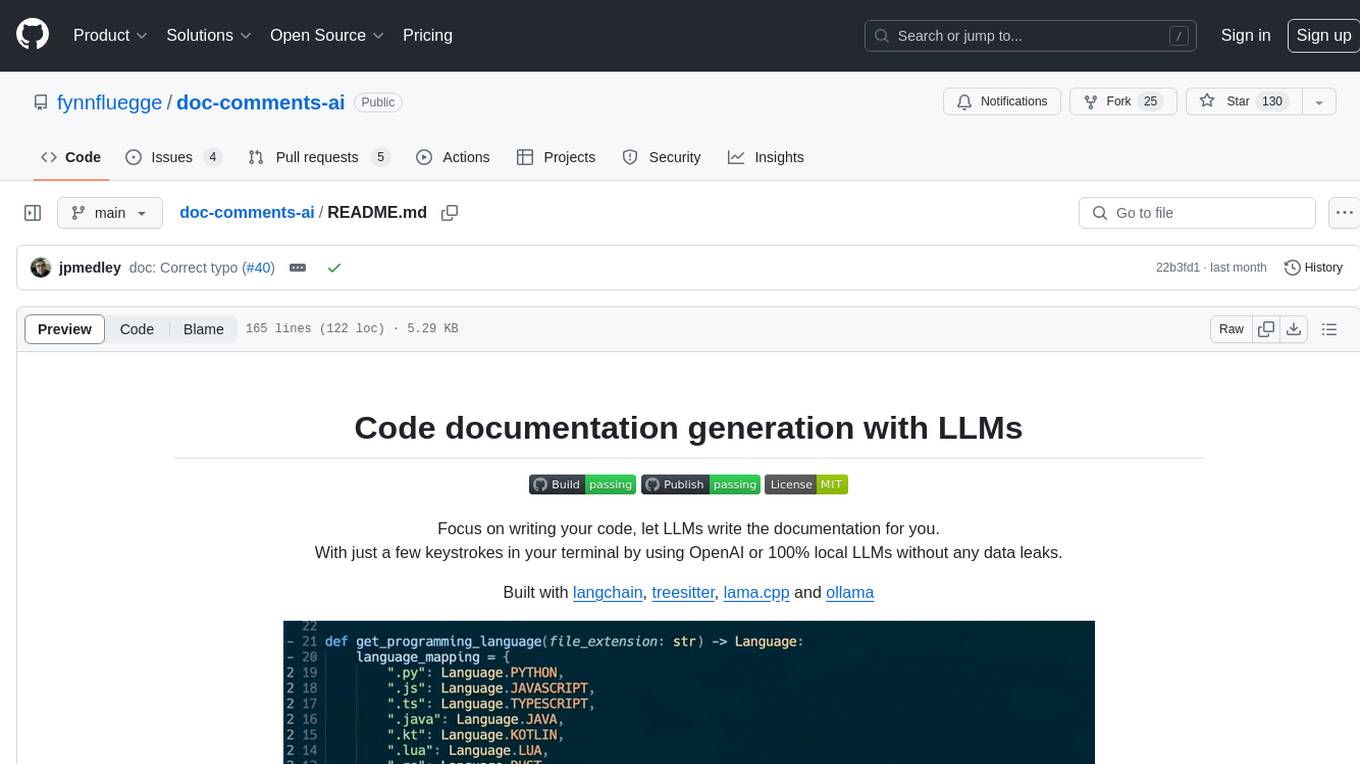
doc-comments-ai
doc-comments-ai is a tool designed to automatically generate code documentation using language models. It allows users to easily create documentation comment blocks for methods in various programming languages such as Python, Typescript, Javascript, Java, Rust, and more. The tool supports both OpenAI and local LLMs, ensuring data privacy and security. Users can generate documentation comments for methods in files, inline comments in method bodies, and choose from different models like GPT-3.5-Turbo, GPT-4, and Azure OpenAI. Additionally, the tool provides support for Treesitter integration and offers guidance on selecting the appropriate model for comprehensive documentation needs.
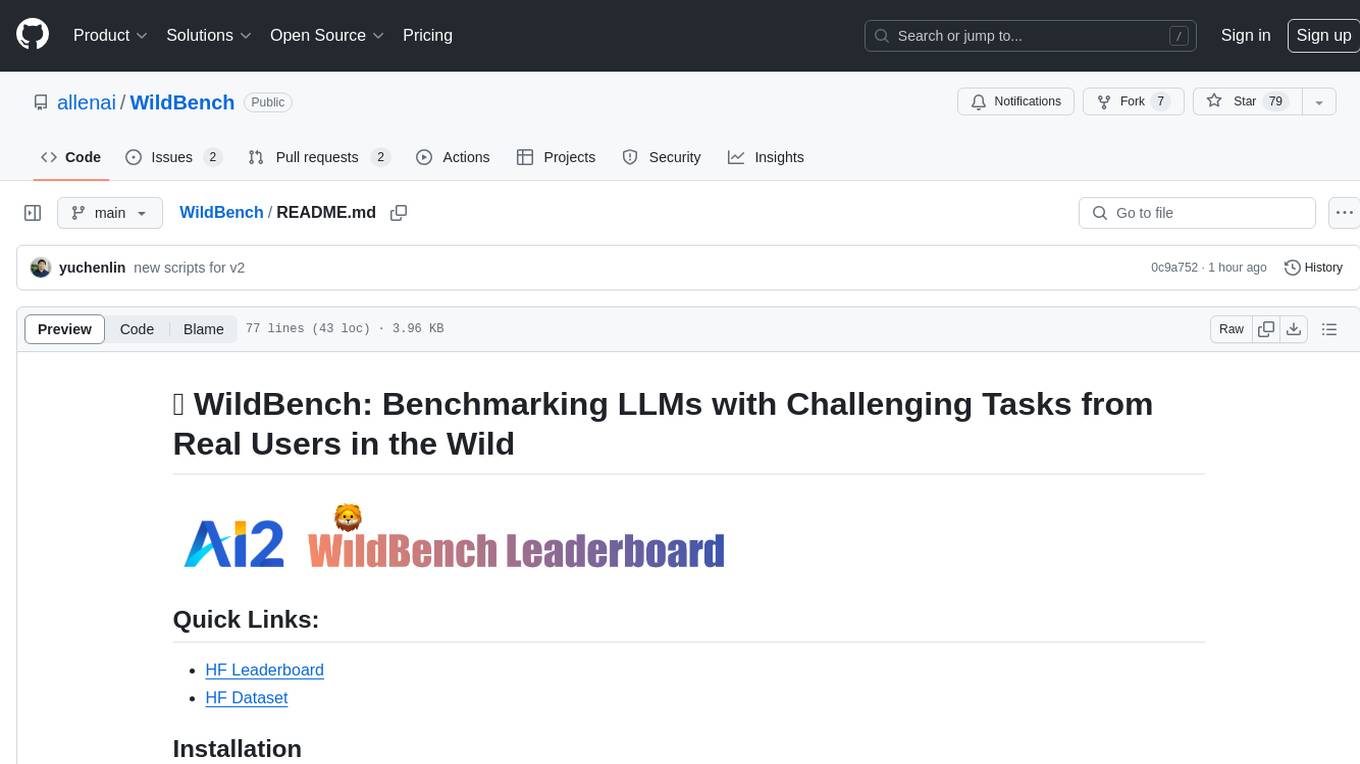
WildBench
WildBench is a tool designed for benchmarking Large Language Models (LLMs) with challenging tasks sourced from real users in the wild. It provides a platform for evaluating the performance of various models on a range of tasks. Users can easily add new models to the benchmark by following the provided guidelines. The tool supports models from Hugging Face and other APIs, allowing for comprehensive evaluation and comparison. WildBench facilitates running inference and evaluation scripts, enabling users to contribute to the benchmark and collaborate on improving model performance.
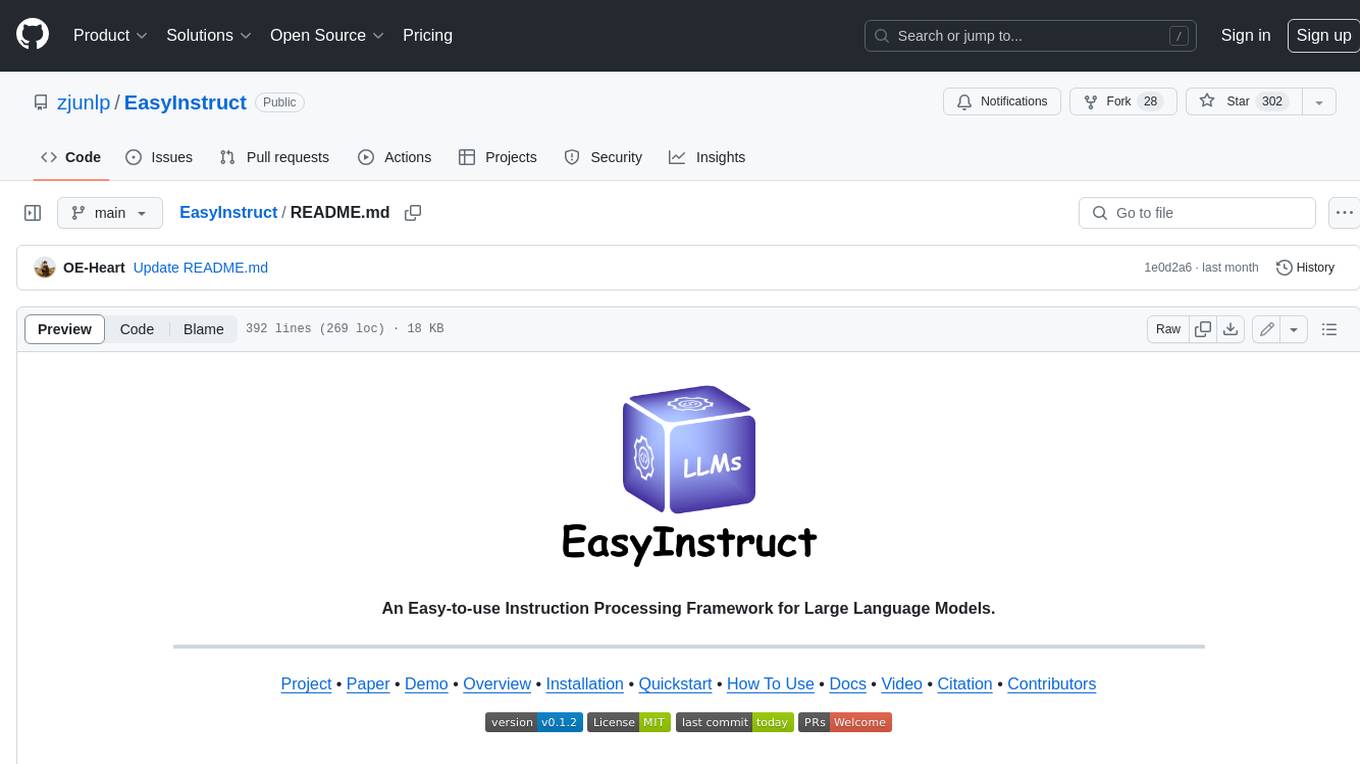
EasyInstruct
EasyInstruct is a Python package proposed as an easy-to-use instruction processing framework for Large Language Models (LLMs) like GPT-4, LLaMA, ChatGLM in your research experiments. EasyInstruct modularizes instruction generation, selection, and prompting, while also considering their combination and interaction.
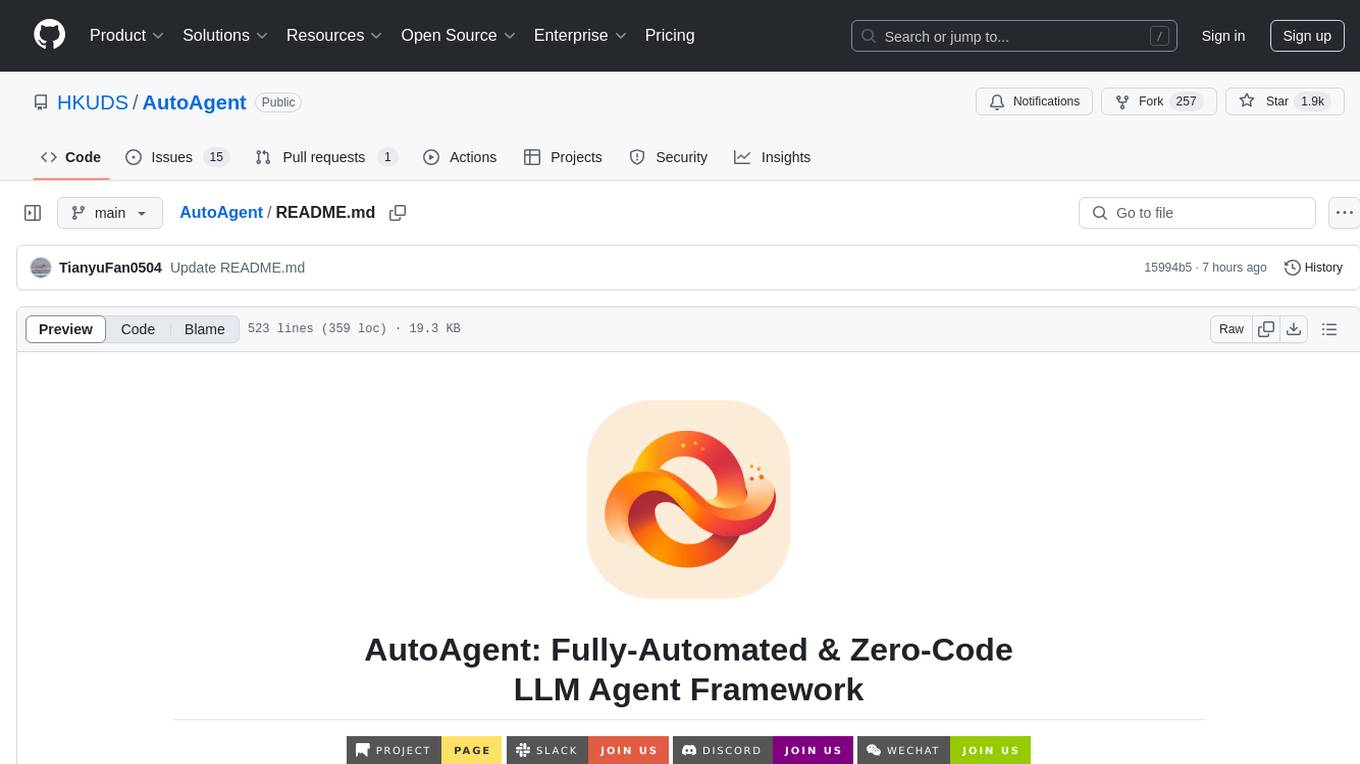
AutoAgent
AutoAgent is a fully-automated and zero-code framework that enables users to create and deploy LLM agents through natural language alone. It is a top performer on the GAIA Benchmark, equipped with a native self-managing vector database, and allows for easy creation of tools, agents, and workflows without any coding. AutoAgent seamlessly integrates with a wide range of LLMs and supports both function-calling and ReAct interaction modes. It is designed to be dynamic, extensible, customized, and lightweight, serving as a personal AI assistant.
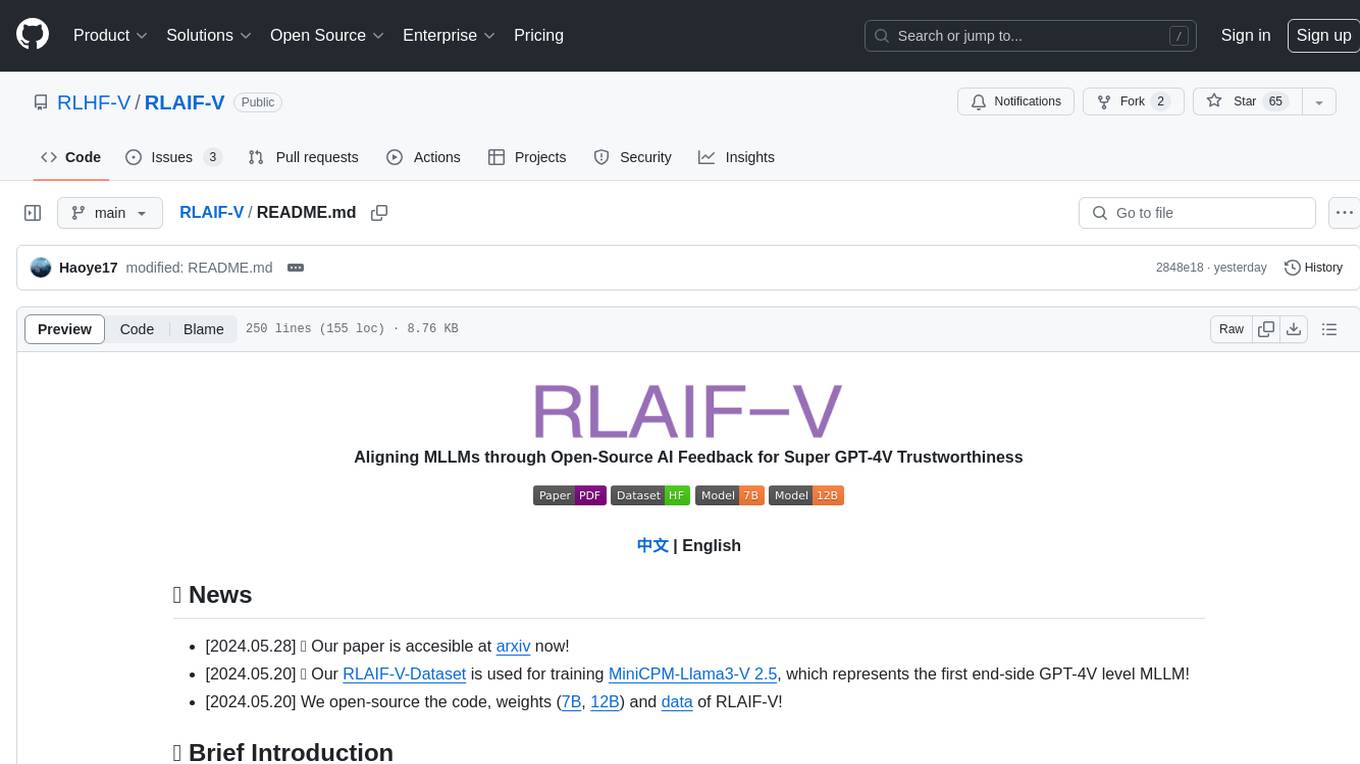
RLAIF-V
RLAIF-V is a novel framework that aligns MLLMs in a fully open-source paradigm for super GPT-4V trustworthiness. It maximally exploits open-source feedback from high-quality feedback data and online feedback learning algorithm. Notable features include achieving super GPT-4V trustworthiness in both generative and discriminative tasks, using high-quality generalizable feedback data to reduce hallucination of different MLLMs, and exhibiting better learning efficiency and higher performance through iterative alignment.
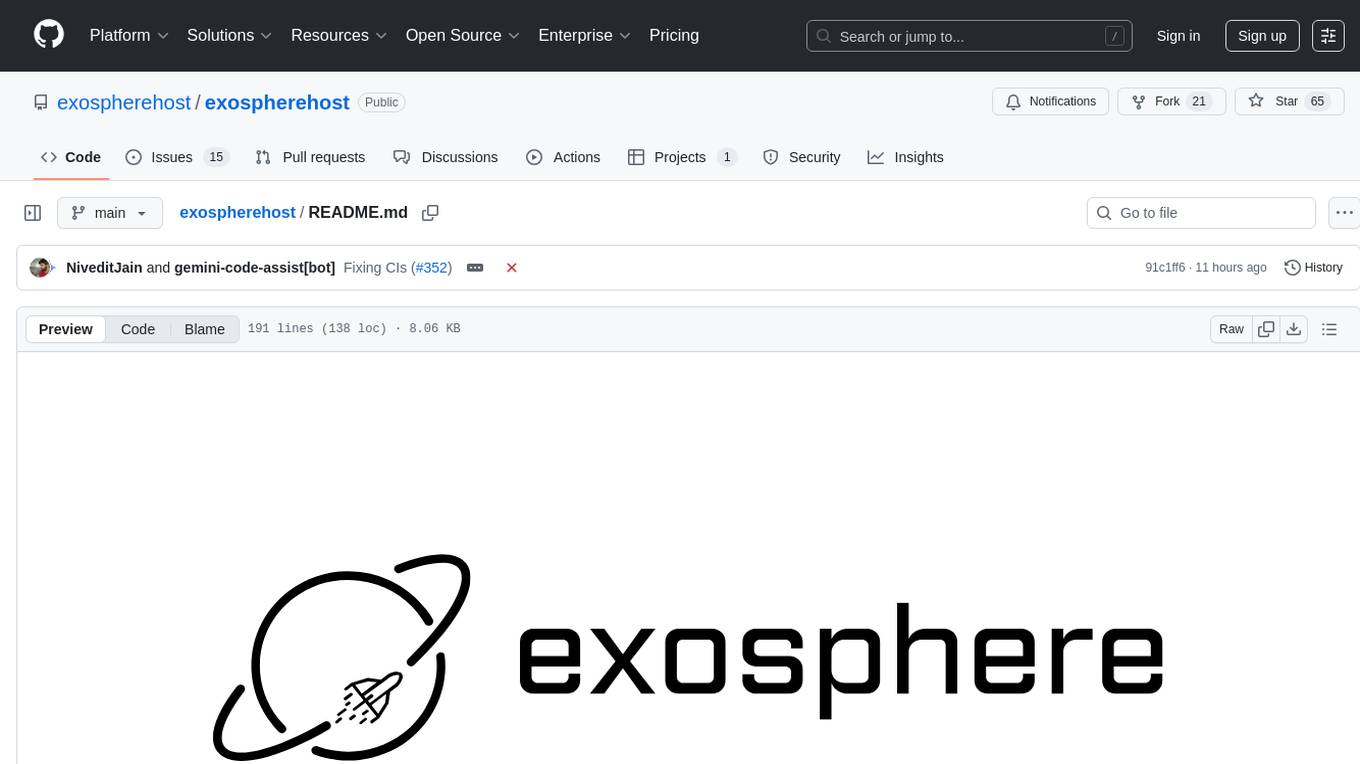
exospherehost
Exosphere is an open source infrastructure designed to run AI agents at scale for large data and long running flows. It allows developers to define plug and playable nodes that can be run on a reliable backbone in the form of a workflow, with features like dynamic state creation at runtime, infinite parallel agents, persistent state management, and failure handling. This enables the deployment of production agents that can scale beautifully to build robust autonomous AI workflows.
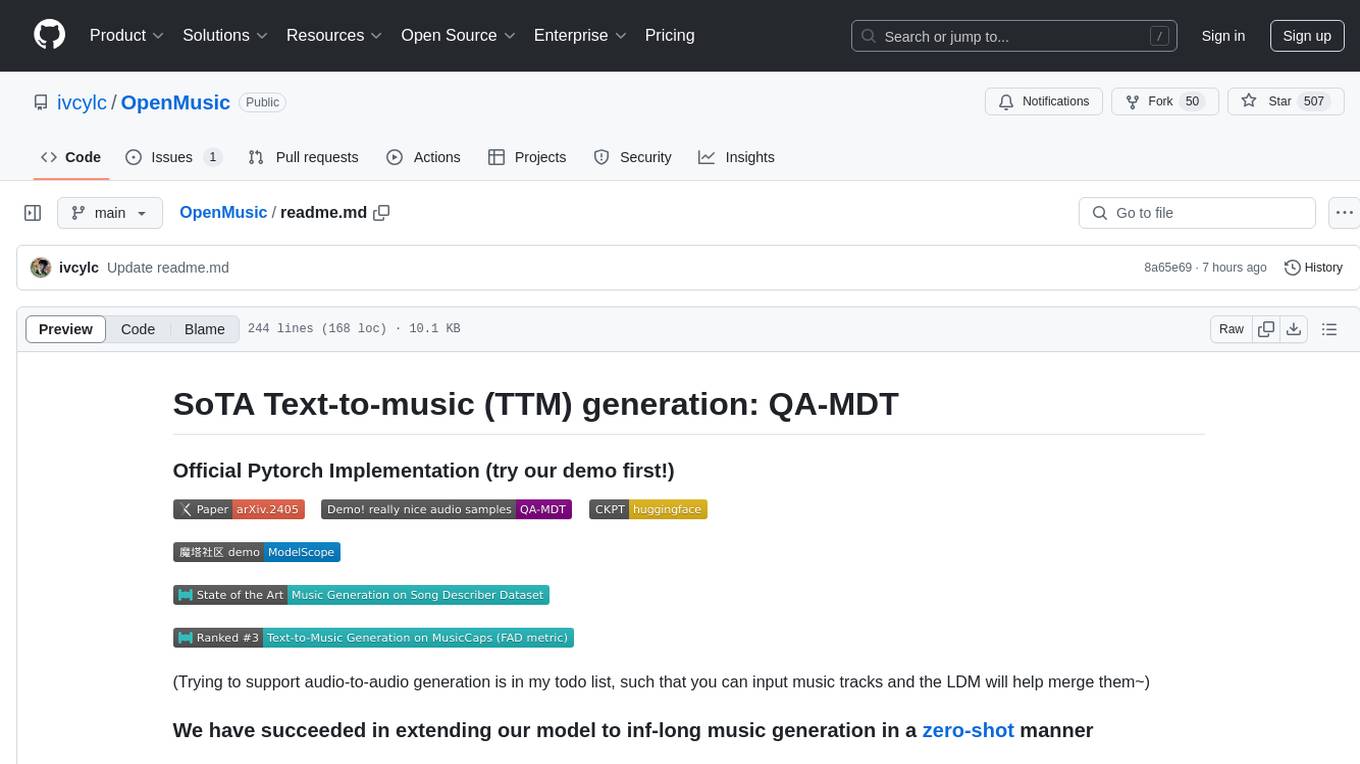
OpenMusic
OpenMusic is a repository providing an implementation of QA-MDT, a Quality-Aware Masked Diffusion Transformer for music generation. The code integrates state-of-the-art models and offers training strategies for music generation. The repository includes implementations of AudioLDM, PixArt-alpha, MDT, AudioMAE, and Open-Sora. Users can train or fine-tune the model using different strategies and datasets. The model is well-pretrained and can be used for music generation tasks. The repository also includes instructions for preparing datasets, training the model, and performing inference. Contact information is provided for any questions or suggestions regarding the project.
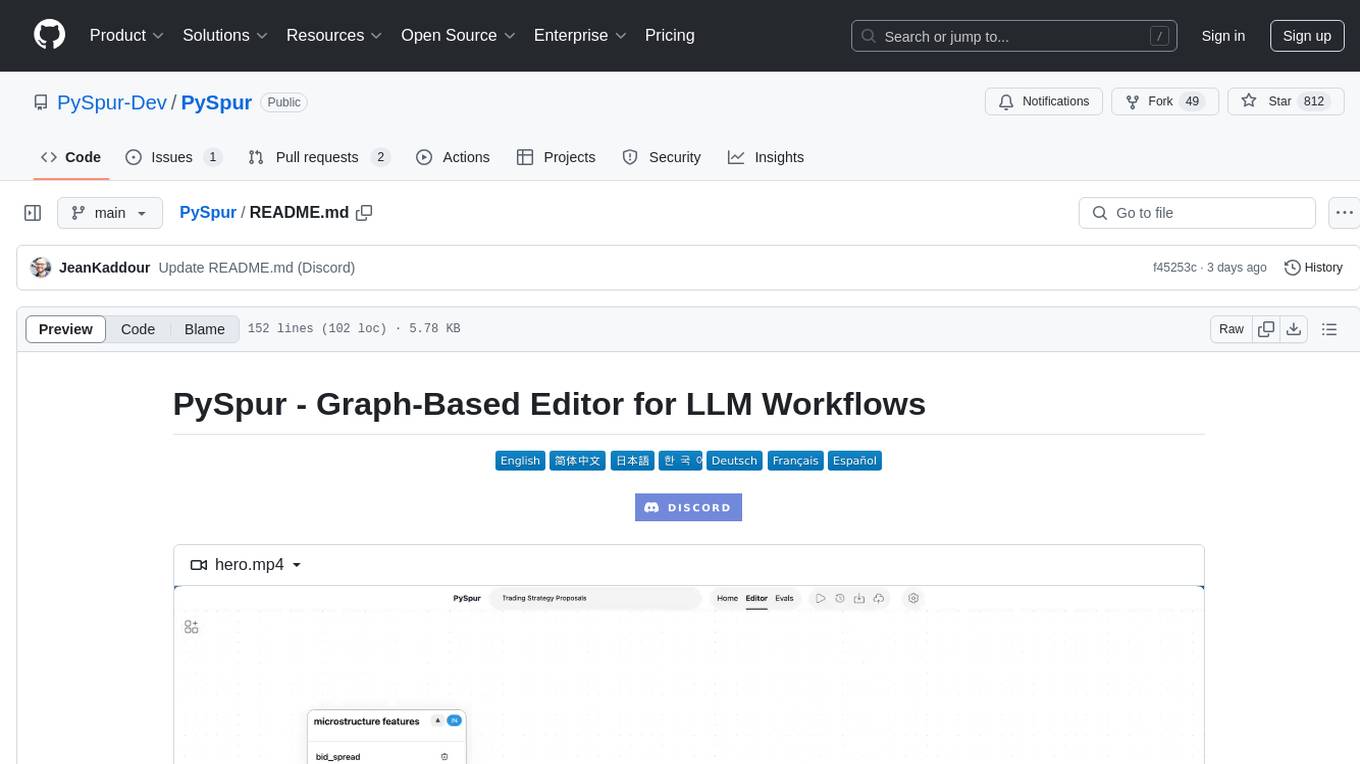
PySpur
PySpur is a graph-based editor designed for LLM workflows, offering modular building blocks for easy workflow creation and debugging at node level. It allows users to evaluate final performance and promises self-improvement features in the future. PySpur is easy-to-hack, supports JSON configs for workflow graphs, and is lightweight with minimal dependencies, making it a versatile tool for workflow management in the field of AI and machine learning.
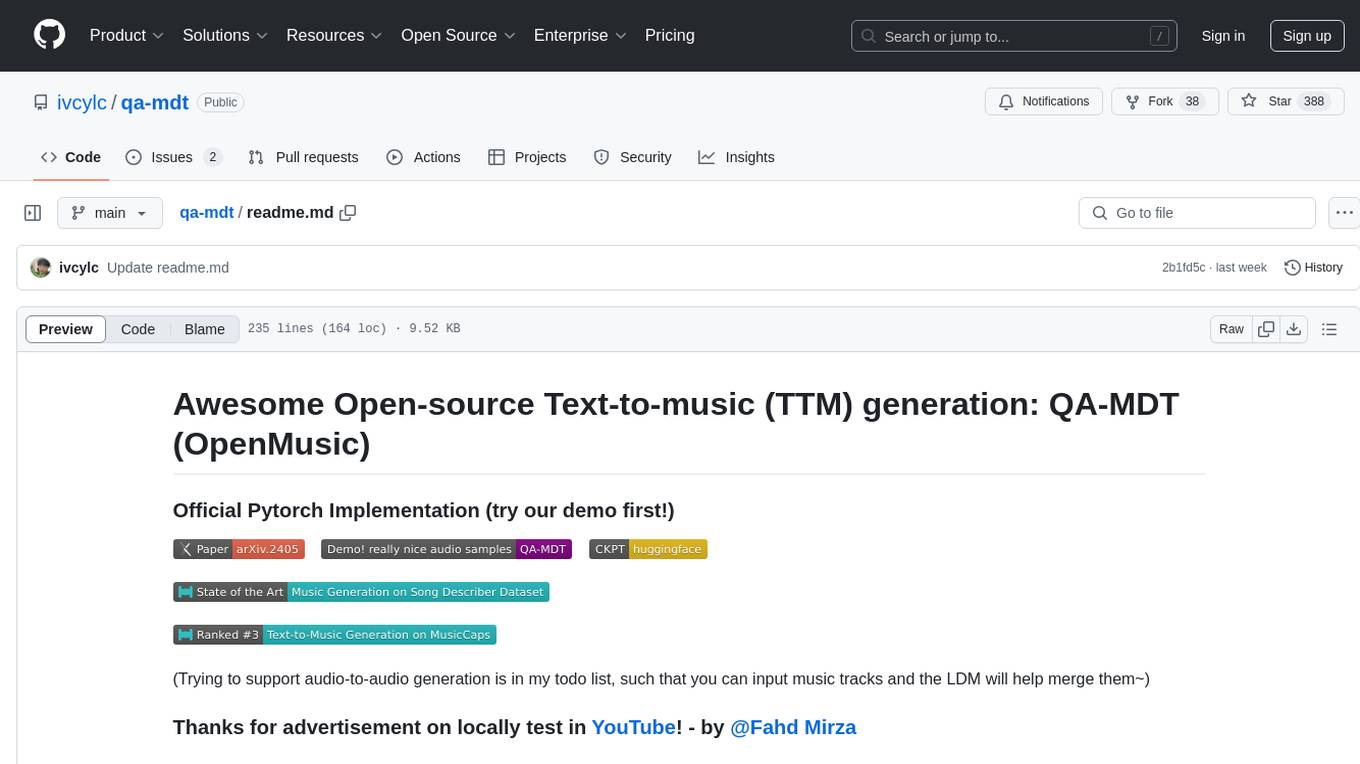
qa-mdt
This repository provides an implementation of QA-MDT, integrating state-of-the-art models for music generation. It offers a Quality-Aware Masked Diffusion Transformer for enhanced music generation. The code is based on various repositories like AudioLDM, PixArt-alpha, MDT, AudioMAE, and Open-Sora. The implementation allows for training and fine-tuning the model with different strategies and datasets. The repository also includes instructions for preparing datasets in LMDB format and provides a script for creating a toy LMDB dataset. The model can be used for music generation tasks, with a focus on quality injection to enhance the musicality of generated music.
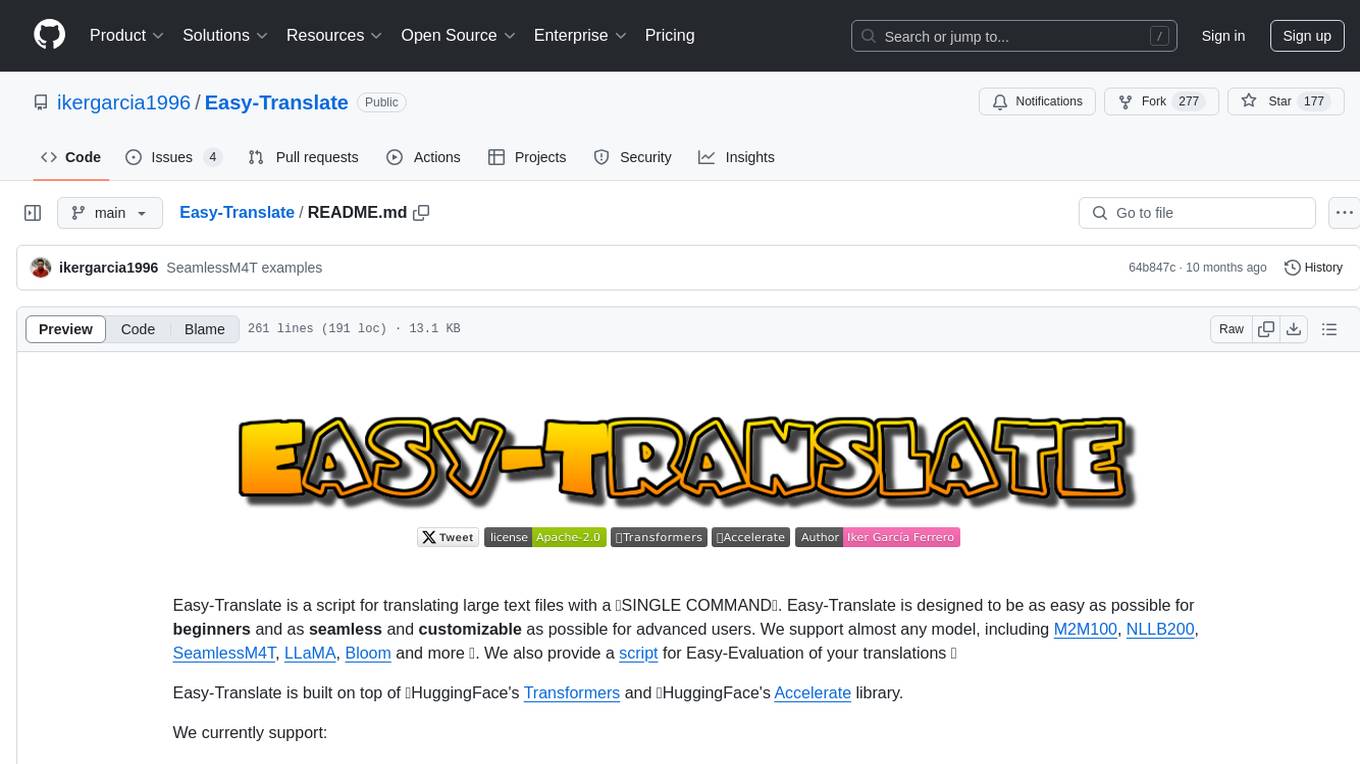
Easy-Translate
Easy-Translate is a script designed for translating large text files with a single command. It supports various models like M2M100, NLLB200, SeamlessM4T, LLaMA, and Bloom. The tool is beginner-friendly and offers seamless and customizable features for advanced users. It allows acceleration on CPU, multi-CPU, GPU, multi-GPU, and TPU, with support for different precisions and decoding strategies. Easy-Translate also provides an evaluation script for translations. Built on HuggingFace's Transformers and Accelerate library, it supports prompt usage and loading huge models efficiently.
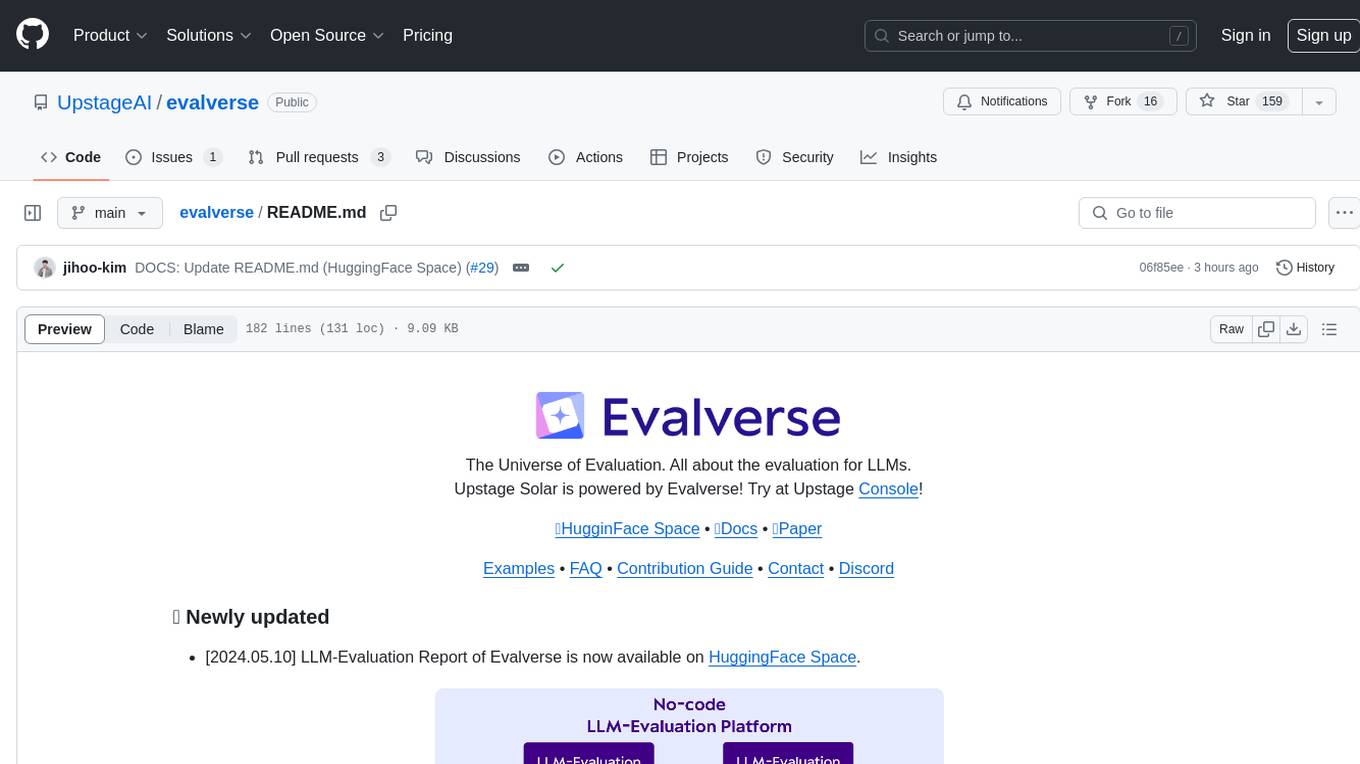
evalverse
Evalverse is an open-source project designed to support Large Language Model (LLM) evaluation needs. It provides a standardized and user-friendly solution for processing and managing LLM evaluations, catering to AI research engineers and scientists. Evalverse supports various evaluation methods, insightful reports, and no-code evaluation processes. Users can access unified evaluation with submodules, request evaluations without code via Slack bot, and obtain comprehensive reports with scores, rankings, and visuals. The tool allows for easy comparison of scores across different models and swift addition of new evaluation tools.
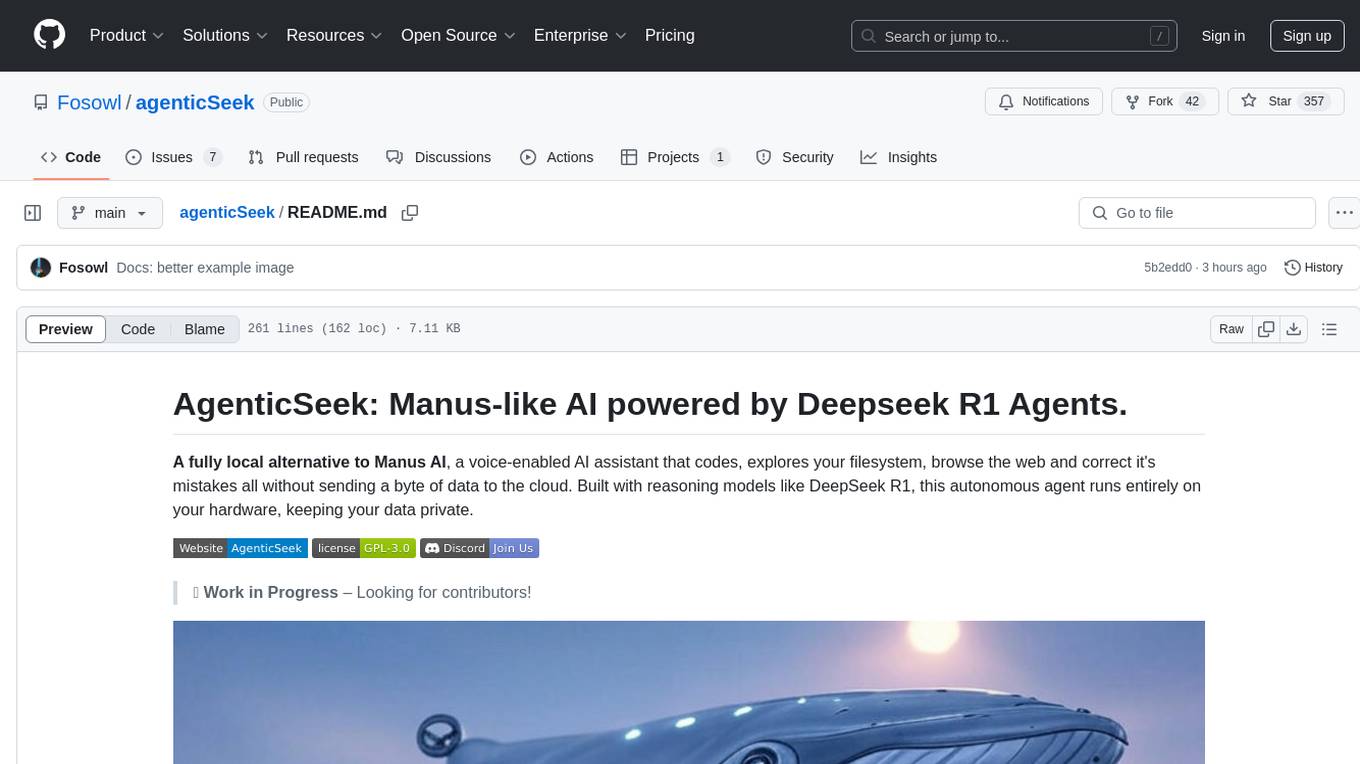
agenticSeek
AgenticSeek is a voice-enabled AI assistant powered by DeepSeek R1 agents, offering a fully local alternative to cloud-based AI services. It allows users to interact with their filesystem, code in multiple languages, and perform various tasks autonomously. The tool is equipped with memory to remember user preferences and past conversations, and it can divide tasks among multiple agents for efficient execution. AgenticSeek prioritizes privacy by running entirely on the user's hardware without sending data to the cloud.
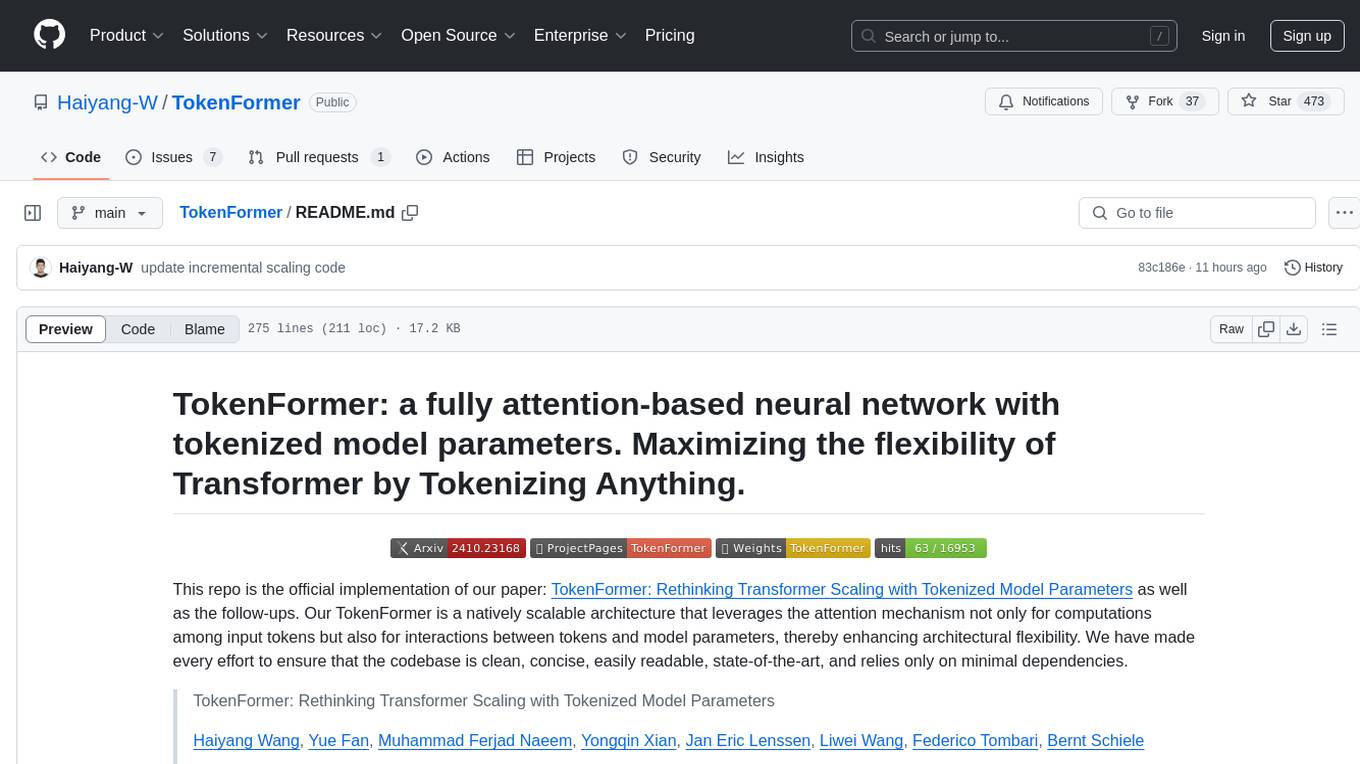
TokenFormer
TokenFormer is a fully attention-based neural network architecture that leverages tokenized model parameters to enhance architectural flexibility. It aims to maximize the flexibility of neural networks by unifying token-token and token-parameter interactions through the attention mechanism. The architecture allows for incremental model scaling and has shown promising results in language modeling and visual modeling tasks. The codebase is clean, concise, easily readable, state-of-the-art, and relies on minimal dependencies.
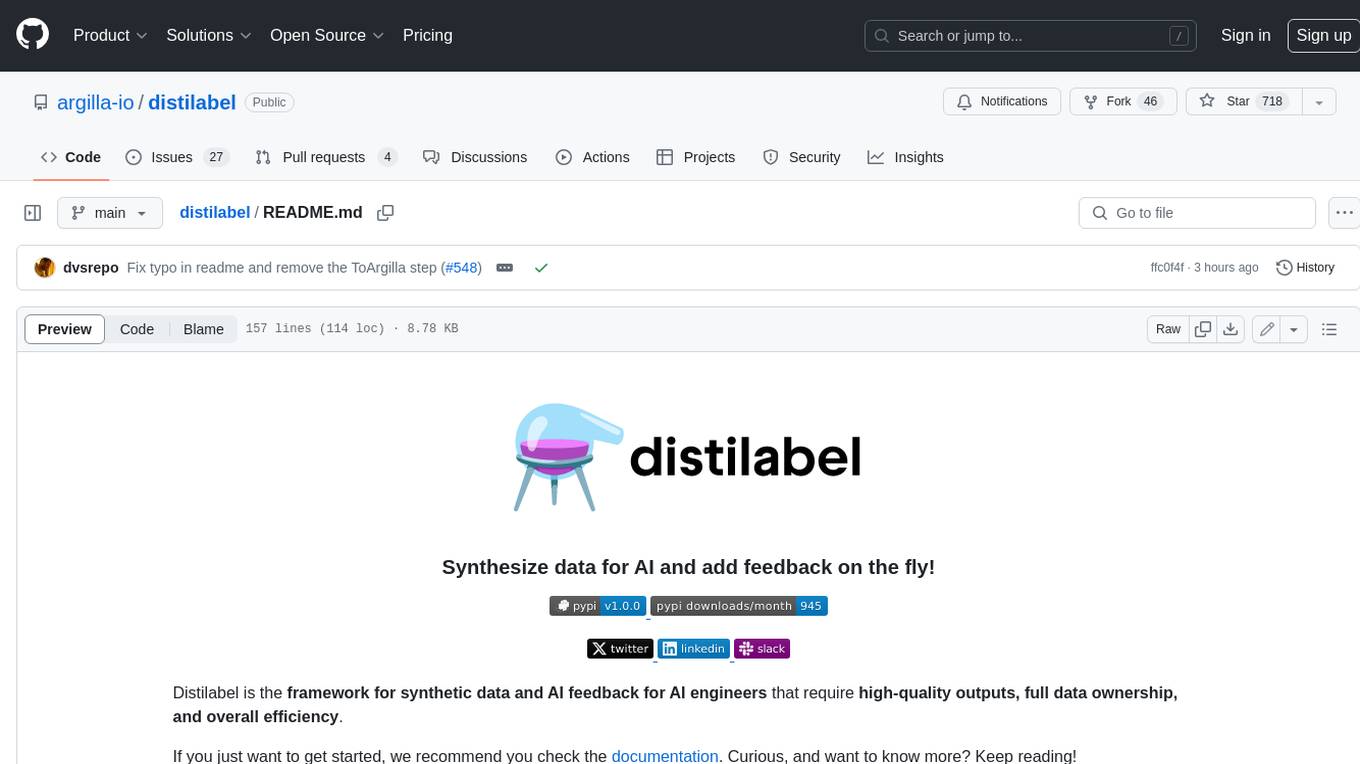
distilabel
Distilabel is a framework for synthetic data and AI feedback for AI engineers that require high-quality outputs, full data ownership, and overall efficiency. It helps you synthesize data and provide AI feedback to improve the quality of your AI models. With Distilabel, you can: * **Synthesize data:** Generate synthetic data to train your AI models. This can help you to overcome the challenges of data scarcity and bias. * **Provide AI feedback:** Get feedback from AI models on your data. This can help you to identify errors and improve the quality of your data. * **Improve your AI output quality:** By using Distilabel to synthesize data and provide AI feedback, you can improve the quality of your AI models and get better results.
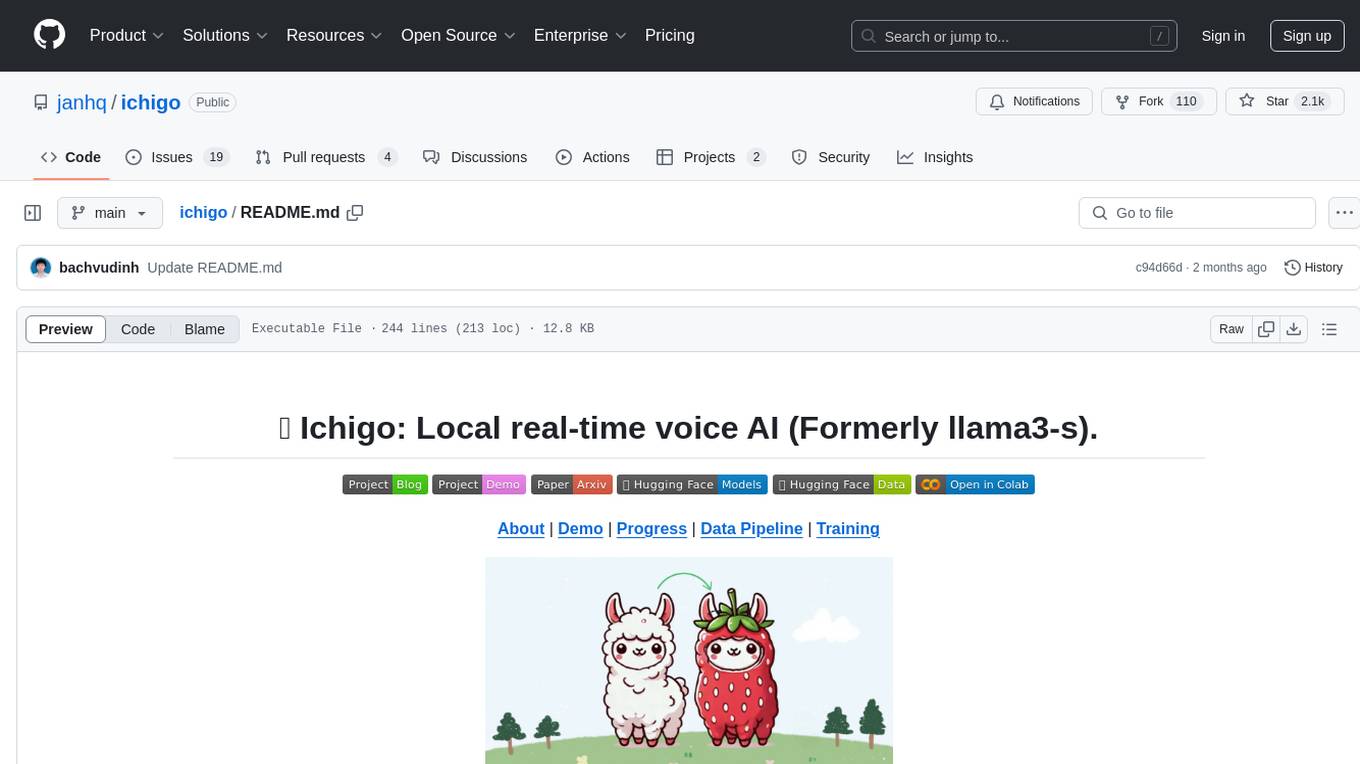
ichigo
Ichigo is a local real-time voice AI tool that uses an early fusion technique to extend a text-based LLM to have native 'listening' ability. It is an open research experiment with improved multiturn capabilities and the ability to refuse processing inaudible queries. The tool is designed for open data, open weight, on-device Siri-like functionality, inspired by Meta's Chameleon paper. Ichigo offers a web UI demo and Gradio web UI for users to interact with the tool. It has achieved enhanced MMLU scores, stronger context handling, advanced noise management, and improved multi-turn capabilities for a robust user experience.
For similar tasks
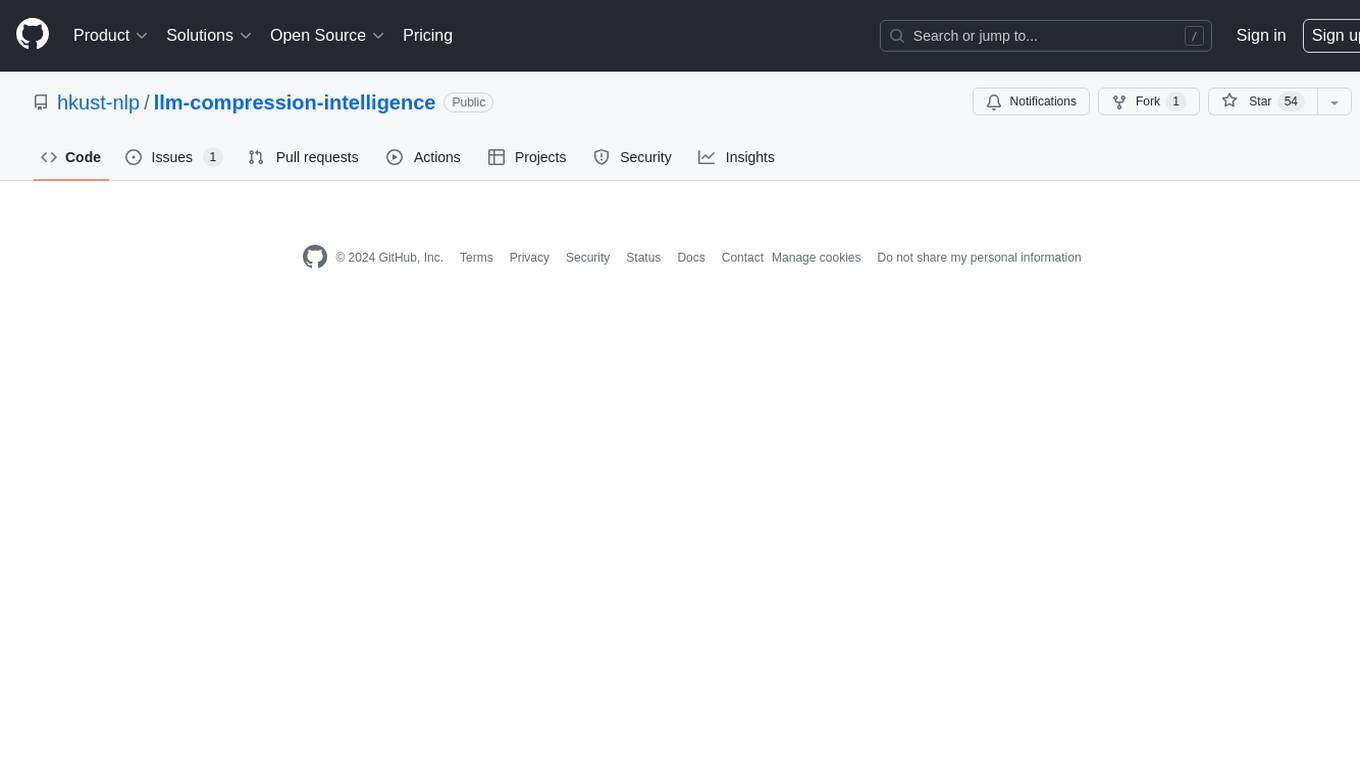
llm-compression-intelligence
This repository presents the findings of the paper "Compression Represents Intelligence Linearly". The study reveals a strong linear correlation between the intelligence of LLMs, as measured by benchmark scores, and their ability to compress external text corpora. Compression efficiency, derived from raw text corpora, serves as a reliable evaluation metric that is linearly associated with model capabilities. The repository includes the compression corpora used in the paper, code for computing compression efficiency, and data collection and processing pipelines.
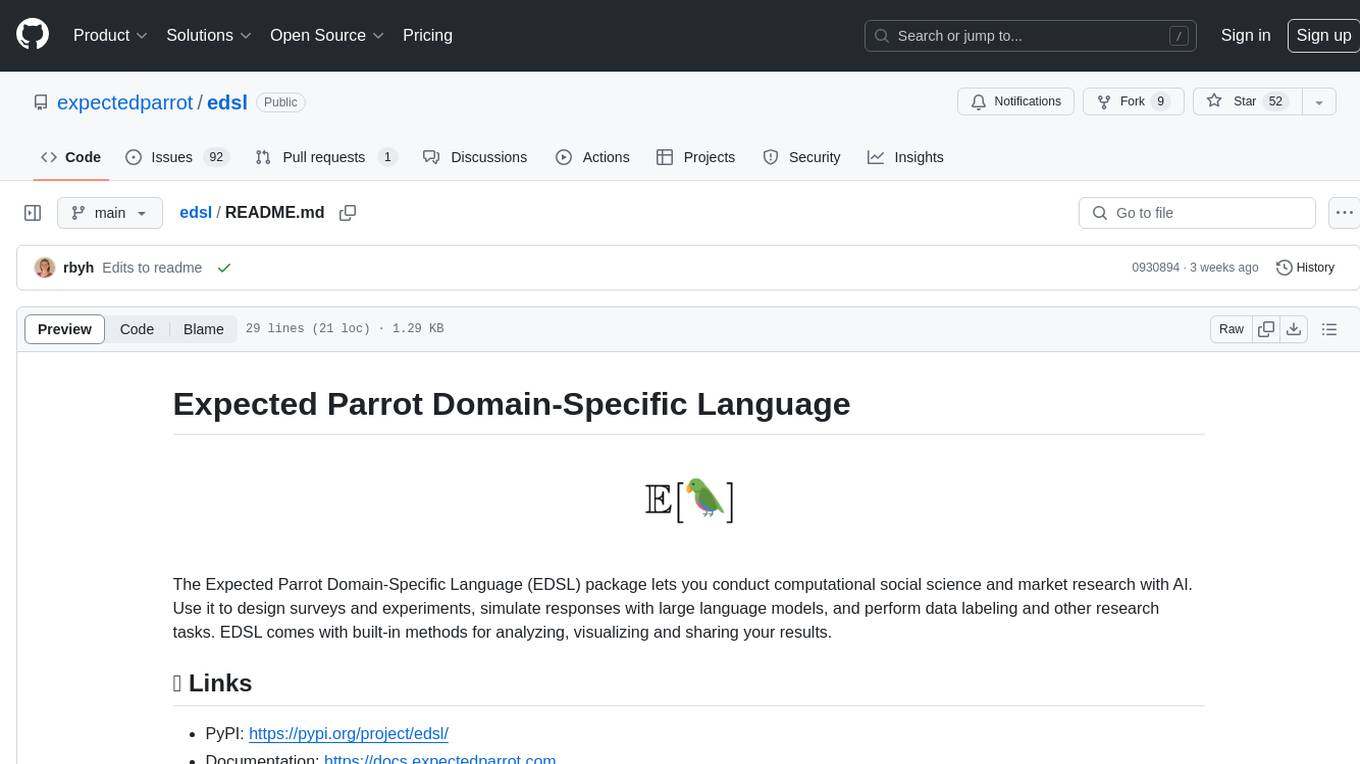
edsl
The Expected Parrot Domain-Specific Language (EDSL) package enables users to conduct computational social science and market research with AI. It facilitates designing surveys and experiments, simulating responses using large language models, and performing data labeling and other research tasks. EDSL includes built-in methods for analyzing, visualizing, and sharing research results. It is compatible with Python 3.9 - 3.11 and requires API keys for LLMs stored in a `.env` file.
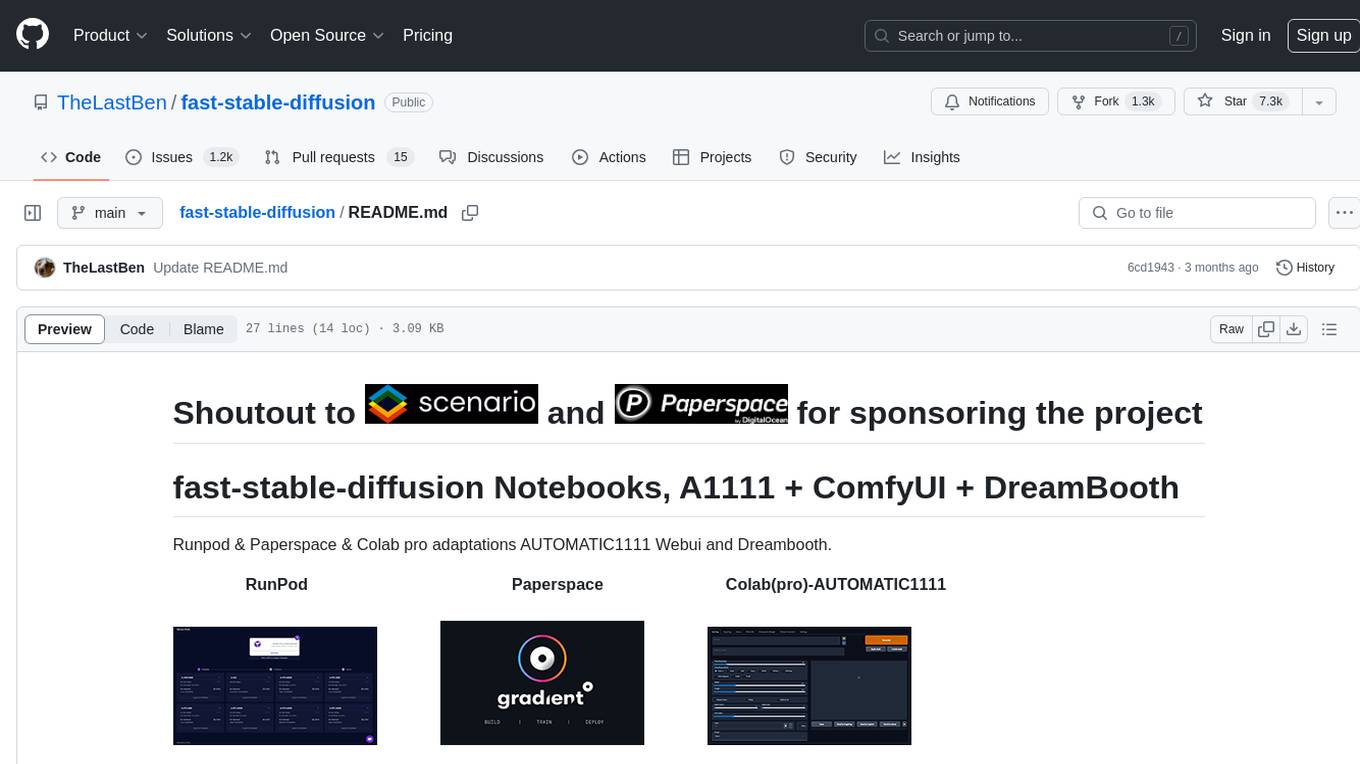
fast-stable-diffusion
Fast-stable-diffusion is a project that offers notebooks for RunPod, Paperspace, and Colab Pro adaptations with AUTOMATIC1111 Webui and Dreambooth. It provides tools for running and implementing Dreambooth, a stable diffusion project. The project includes implementations by XavierXiao and is sponsored by Runpod, Paperspace, and Colab Pro.
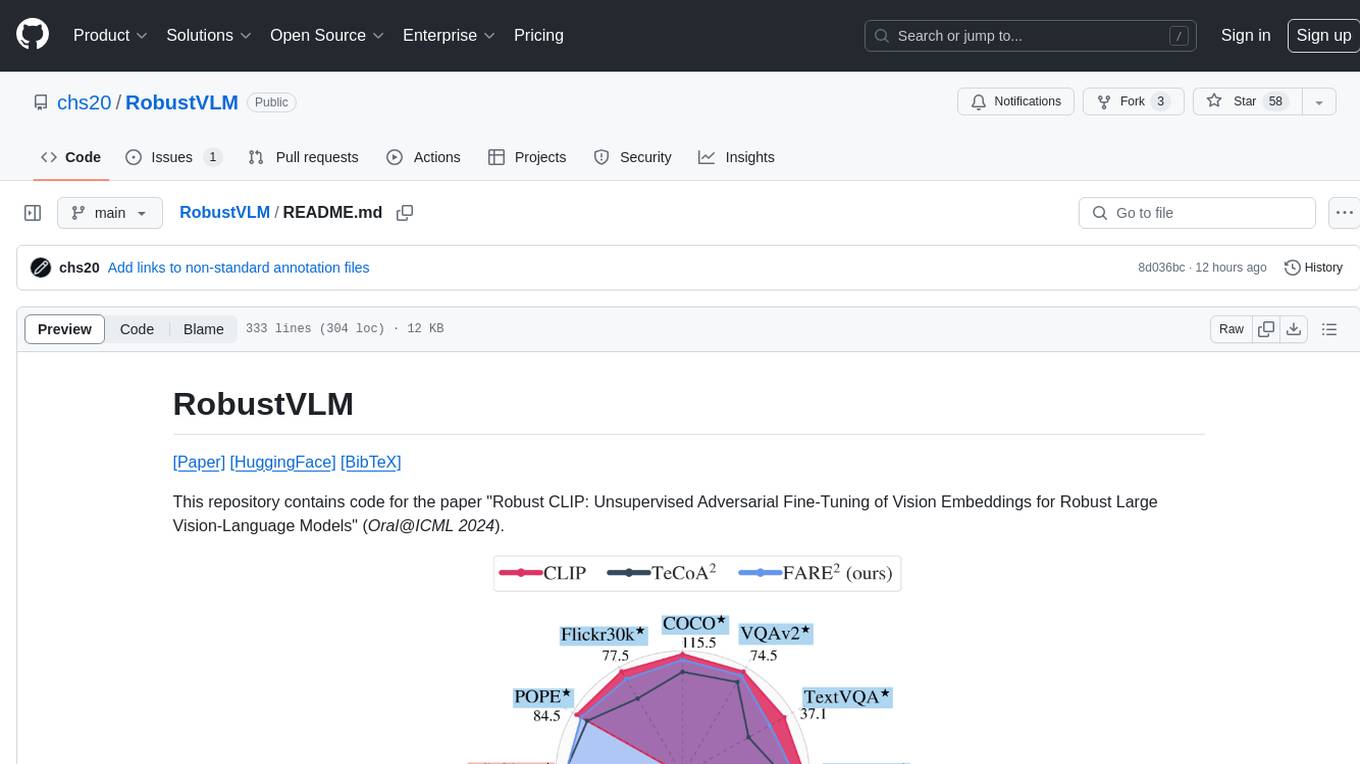
RobustVLM
This repository contains code for the paper 'Robust CLIP: Unsupervised Adversarial Fine-Tuning of Vision Embeddings for Robust Large Vision-Language Models'. It focuses on fine-tuning CLIP in an unsupervised manner to enhance its robustness against visual adversarial attacks. By replacing the vision encoder of large vision-language models with the fine-tuned CLIP models, it achieves state-of-the-art adversarial robustness on various vision-language tasks. The repository provides adversarially fine-tuned ViT-L/14 CLIP models and offers insights into zero-shot classification settings and clean accuracy improvements.
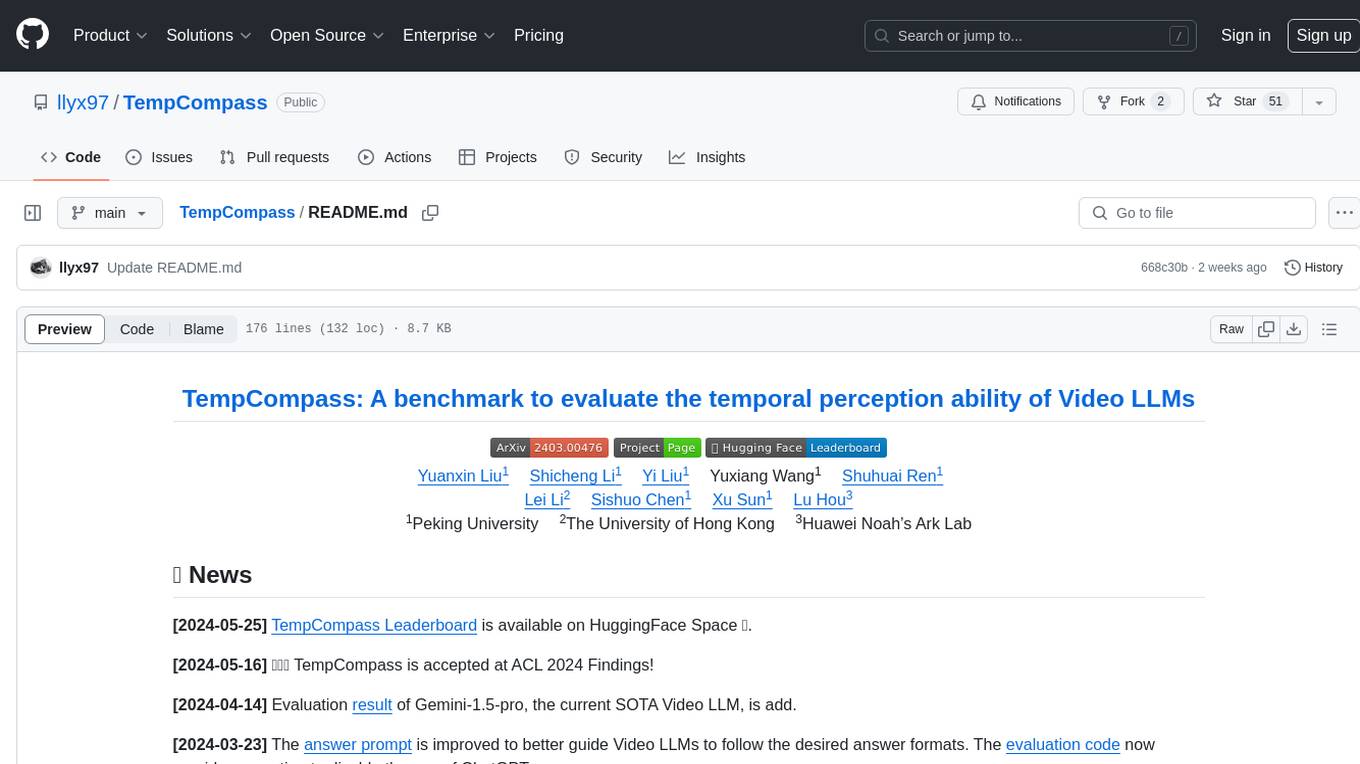
TempCompass
TempCompass is a benchmark designed to evaluate the temporal perception ability of Video LLMs. It encompasses a diverse set of temporal aspects and task formats to comprehensively assess the capability of Video LLMs in understanding videos. The benchmark includes conflicting videos to prevent models from relying on single-frame bias and language priors. Users can clone the repository, install required packages, prepare data, run inference using examples like Video-LLaVA and Gemini, and evaluate the performance of their models across different tasks such as Multi-Choice QA, Yes/No QA, Caption Matching, and Caption Generation.
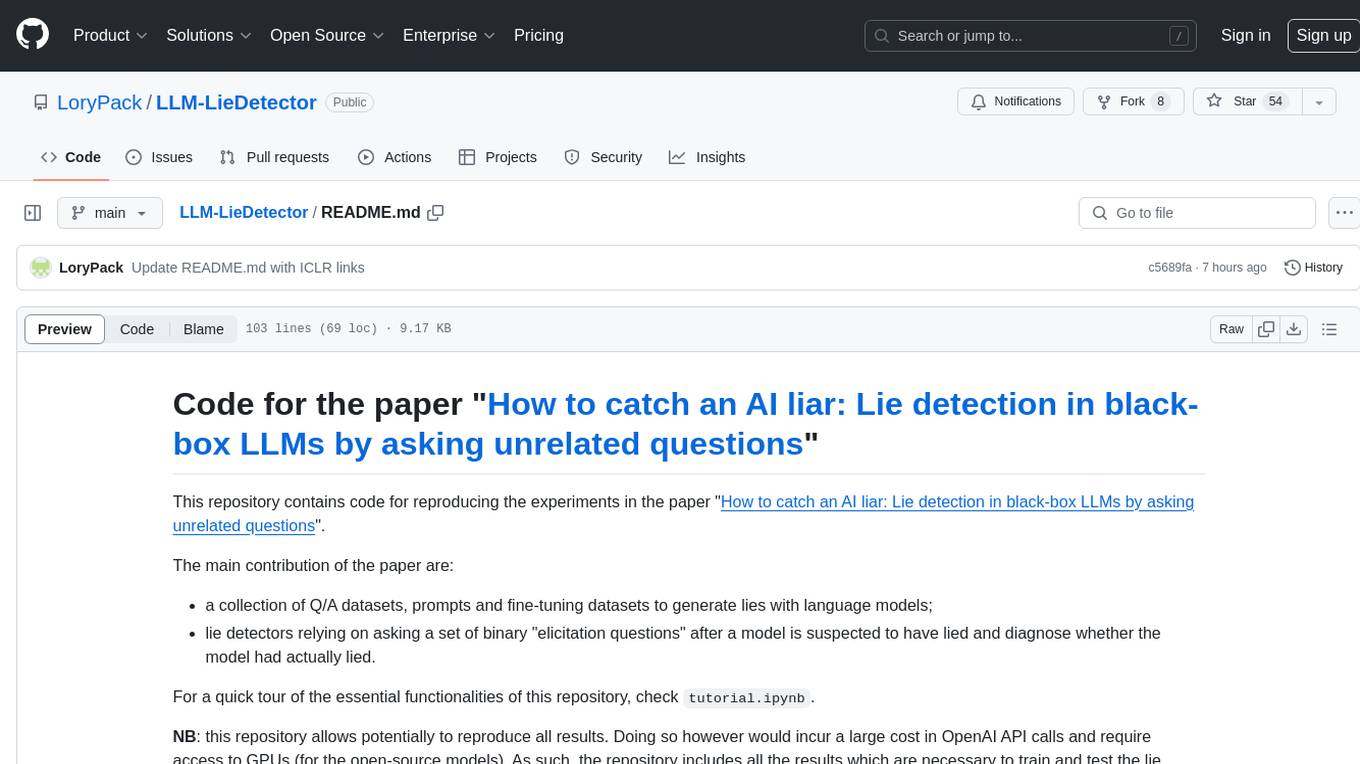
LLM-LieDetector
This repository contains code for reproducing experiments on lie detection in black-box LLMs by asking unrelated questions. It includes Q/A datasets, prompts, and fine-tuning datasets for generating lies with language models. The lie detectors rely on asking binary 'elicitation questions' to diagnose whether the model has lied. The code covers generating lies from language models, training and testing lie detectors, and generalization experiments. It requires access to GPUs and OpenAI API calls for running experiments with open-source models. Results are stored in the repository for reproducibility.

bigcodebench
BigCodeBench is an easy-to-use benchmark for code generation with practical and challenging programming tasks. It aims to evaluate the true programming capabilities of large language models (LLMs) in a more realistic setting. The benchmark is designed for HumanEval-like function-level code generation tasks, but with much more complex instructions and diverse function calls. BigCodeBench focuses on the evaluation of LLM4Code with diverse function calls and complex instructions, providing precise evaluation & ranking and pre-generated samples to accelerate code intelligence research. It inherits the design of the EvalPlus framework but differs in terms of execution environment and test evaluation.
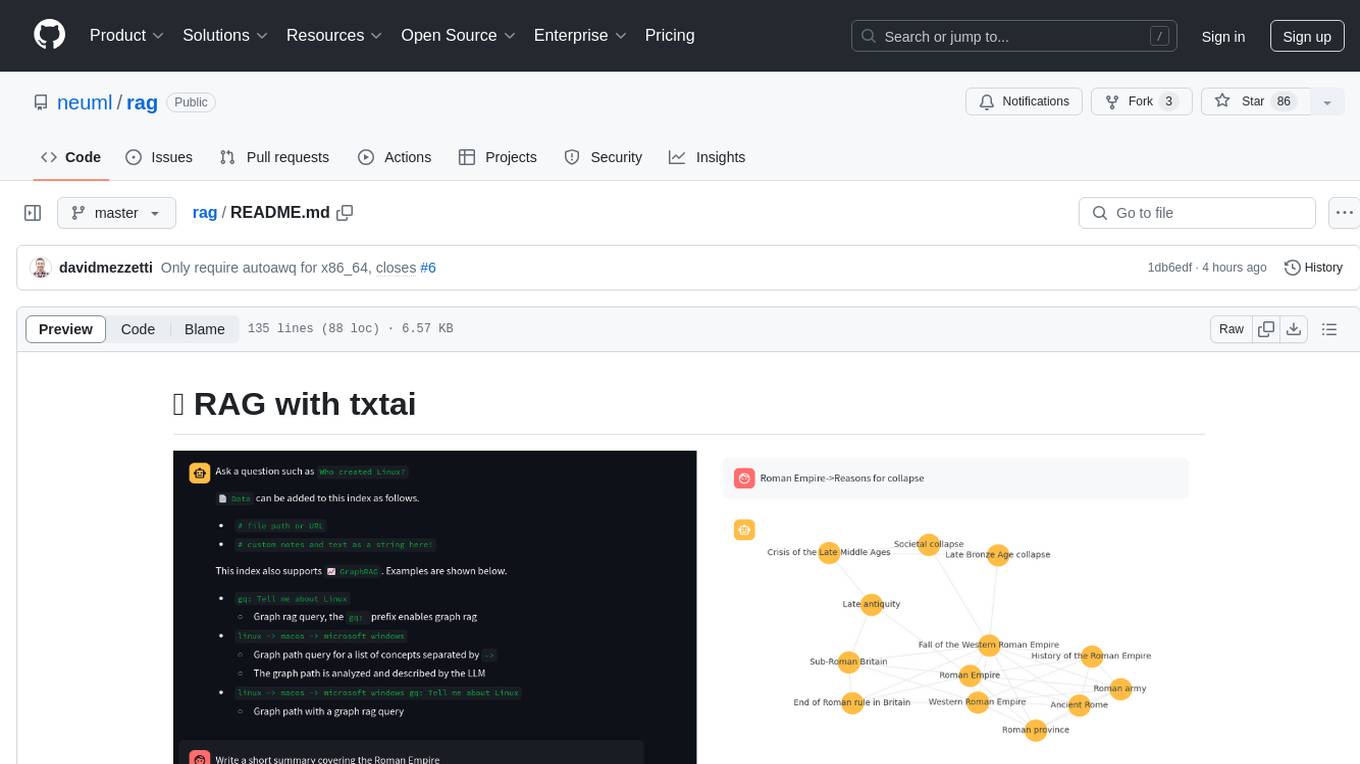
rag
RAG with txtai is a Retrieval Augmented Generation (RAG) Streamlit application that helps generate factually correct content by limiting the context in which a Large Language Model (LLM) can generate answers. It supports two categories of RAG: Vector RAG, where context is supplied via a vector search query, and Graph RAG, where context is supplied via a graph path traversal query. The application allows users to run queries, add data to the index, and configure various parameters to control its behavior.
For similar jobs

weave
Weave is a toolkit for developing Generative AI applications, built by Weights & Biases. With Weave, you can log and debug language model inputs, outputs, and traces; build rigorous, apples-to-apples evaluations for language model use cases; and organize all the information generated across the LLM workflow, from experimentation to evaluations to production. Weave aims to bring rigor, best-practices, and composability to the inherently experimental process of developing Generative AI software, without introducing cognitive overhead.

agentcloud
AgentCloud is an open-source platform that enables companies to build and deploy private LLM chat apps, empowering teams to securely interact with their data. It comprises three main components: Agent Backend, Webapp, and Vector Proxy. To run this project locally, clone the repository, install Docker, and start the services. The project is licensed under the GNU Affero General Public License, version 3 only. Contributions and feedback are welcome from the community.

oss-fuzz-gen
This framework generates fuzz targets for real-world `C`/`C++` projects with various Large Language Models (LLM) and benchmarks them via the `OSS-Fuzz` platform. It manages to successfully leverage LLMs to generate valid fuzz targets (which generate non-zero coverage increase) for 160 C/C++ projects. The maximum line coverage increase is 29% from the existing human-written targets.

LLMStack
LLMStack is a no-code platform for building generative AI agents, workflows, and chatbots. It allows users to connect their own data, internal tools, and GPT-powered models without any coding experience. LLMStack can be deployed to the cloud or on-premise and can be accessed via HTTP API or triggered from Slack or Discord.

VisionCraft
The VisionCraft API is a free API for using over 100 different AI models. From images to sound.

kaito
Kaito is an operator that automates the AI/ML inference model deployment in a Kubernetes cluster. It manages large model files using container images, avoids tuning deployment parameters to fit GPU hardware by providing preset configurations, auto-provisions GPU nodes based on model requirements, and hosts large model images in the public Microsoft Container Registry (MCR) if the license allows. Using Kaito, the workflow of onboarding large AI inference models in Kubernetes is largely simplified.

PyRIT
PyRIT is an open access automation framework designed to empower security professionals and ML engineers to red team foundation models and their applications. It automates AI Red Teaming tasks to allow operators to focus on more complicated and time-consuming tasks and can also identify security harms such as misuse (e.g., malware generation, jailbreaking), and privacy harms (e.g., identity theft). The goal is to allow researchers to have a baseline of how well their model and entire inference pipeline is doing against different harm categories and to be able to compare that baseline to future iterations of their model. This allows them to have empirical data on how well their model is doing today, and detect any degradation of performance based on future improvements.

Azure-Analytics-and-AI-Engagement
The Azure-Analytics-and-AI-Engagement repository provides packaged Industry Scenario DREAM Demos with ARM templates (Containing a demo web application, Power BI reports, Synapse resources, AML Notebooks etc.) that can be deployed in a customer’s subscription using the CAPE tool within a matter of few hours. Partners can also deploy DREAM Demos in their own subscriptions using DPoC.







